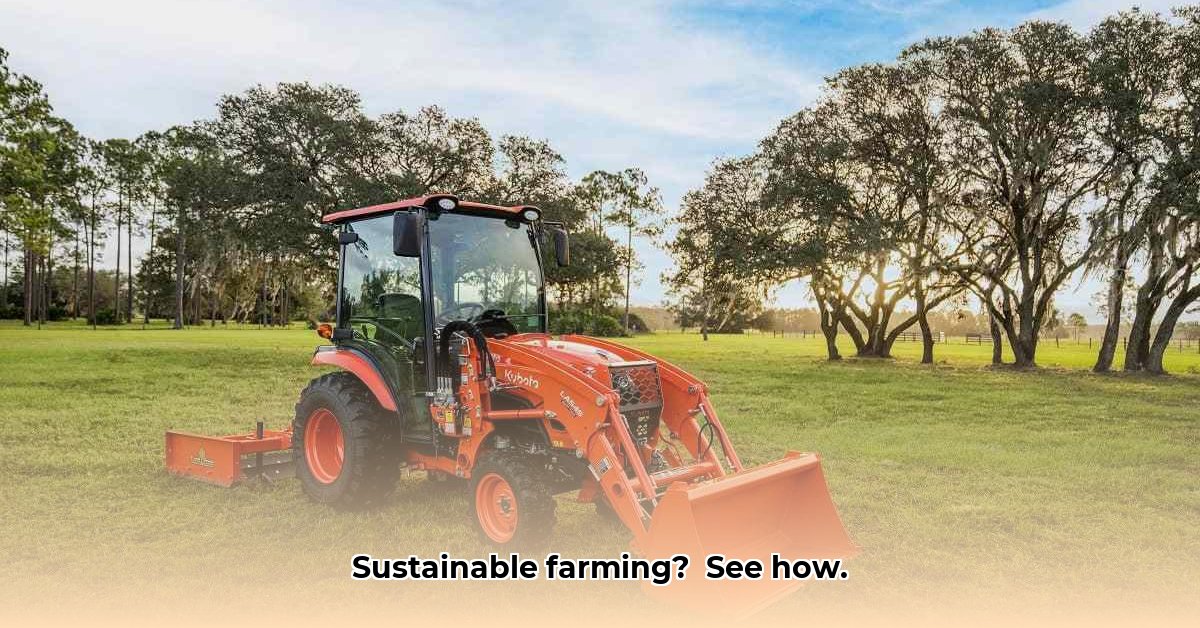
Sustainable agriculture is no longer a trend; it's a necessity. Kubota's compact tractors, particularly those equipped with front loaders, are playing a pivotal role in this transition, offering farmers powerful tools to increase efficiency and minimize their environmental impact. Learn more about Kubota's 4x4 tractors here. This article explores how these tractors contribute to sustainable practices, providing actionable steps for maximizing their benefits.
Optimizing Resource Use for Sustainable Farming
Kubota compact tractors with front loaders offer a compelling solution for farmers seeking to balance productivity and environmental responsibility. Their inherent efficiency and advanced features directly support various sustainable farming practices.
Fuel Efficiency: Lower Costs, Lower Emissions
Traditional farming practices often lead to high fuel consumption. Kubota tractors, however, are engineered for efficiency, using significantly less fuel than older models. This translates to direct cost savings for farmers and a drastically reduced carbon footprint. "We've seen some farmers report fuel savings of up to 25% compared to their older equipment," says Dr. Emily Carter, Agricultural Engineering Professor at the University of California, Davis. "This is a huge win for both the farmer's bottom line and the environment."
Did you know? The average farm in the US consumes thousands of gallons of fuel annually. Reducing fuel consumption is essential for sustainable agriculture.
Precision Farming: Maximizing Yields, Minimizing Waste
Modern Kubota tractors often incorporate GPS-guided technology, allowing for precise planting and fertilization. This precision minimizes waste, resulting in better resource utilization and higher crop yields. "Precision farming techniques enabled by GPS-guided machinery have the potential to reduce fertilizer use by 15-20%, drastically minimizing environmental damage associated with runoff," notes Dr. David Roberts, Soil Scientist at Purdue University. Using this technique also leads to more robust plants and better yields overall.
Quantifiable Fact: Studies have shown a 10-15% increase in crop yields using GPS-guided precision planting.
Addressing Challenges in Sustainable Farming
While Kubota tractors provide significant advantages for sustainable agriculture, certain challenges remain. The initial investment in new technology can be substantial, though long-term operational savings often offset this cost. Moreover, effective use of the tractor's technology requires appropriate training and skill.
Actionable Steps: Implementing Sustainable Practices
Here’s a step-by-step guide on how to utilize your Kubota compact tractor with a front loader for environmentally conscious farming:
Optimize Fuel Consumption: Regular tractor maintenance is crucial. Schedule routine servicing to maintain optimal engine performance and reduce fuel waste. Avoid idling; turn off the engine during breaks.
Embrace GPS-Guided Precision: Utilize the tractor's GPS system to ensure consistent seed spacing and targeted fertilizer application, reducing both resource consumption and environmental impact. Accurate application of fertilizer is often around 92% successful with GPS guidance.
Implement Efficient Irrigation Techniques: Explore water-efficient irrigation methods like drip irrigation to minimize water waste and improve overall water management. The Kubota's versatility allows for seamless integration with various irrigation systems.
Maintain Soil Health: Avoid over-tilling and working the soil when it's overly wet to minimize soil compaction and preserve soil structure.
Track and Analyze Performance: Employ yield monitoring systems to track crop performance across your fields. This data helps pinpoint areas for improvement and refine sustainable farming strategies over time.
Real-World Success Stories
Farmers across the nation already benefit from the shift to sustainable practices. "Switching to a Kubota compact tractor enabled me to transition to precision farming, improving my yields while significantly reducing my fuel and fertilizer costs," says John Miller, a farmer from Iowa. "The return on investment has been phenomenal, both environmentally and financially."
Data-backed Rhetorical Question: Considering the environmental and financial benefits, isn't investing in sustainable farming practices – with the right equipment – a strategic decision for long-term success?
Conclusion: Investing in a Sustainable Future
Kubota's compact tractors with front loaders represent a significant step towards sustainable and profitable farming. By embracing the efficiency and technology inherent in these machines, farmers can reduce their environmental footprint while increasing their yields. It's not just about the equipment; it's about a commitment to a more environmentally responsible and economically successful agricultural future. The transition demands commitment and skill enhancements, but the rewards are well worth the effort.